Australian Open, Melbourne
January 16-29, 2006; 128 Draw (32 seeded); Surface – Hard
The last Australian Open without the hawk-eye system, and extremely emotional one… Marcos Baghdatis playing just 17th tournament at the main level, stunned four seeded players, including three Top 10ers in a row during night sessions at Rod Laver Arena! ‘Baggy’ delivered an inspired tennis with a grin, which generated for him an enormous support from the Australian crowd (especially the Greek colony). He was stopped in the final by Roger Federer, who collected third consecutive major and cried like a child as he received the trophy from the legendary Rod Laver. Dominik Hrbaty became the fourth man to play four consecutive 5-setters in a Grand Slam event.
All scorelines
First round: John Pye
 Third-seeded Lleyton Hewitt survived a scare in the first round of the Australian Open on Tuesday, overcoming Melbourne Park rookie Robin Vik in five sets. Hewitt, who lost in the finals last year to Marat Safin, struggled against the 58th-ranked Vik before closing a 6-4, 2-6, 5-7, 7-6(4), 6-3 victory in 3 hours, 46 minutes. “I would have probably collapsed if I was going to lose today,” Hewitt said. “I just tried hanging in there and waiting for my opportunities. I just bided my time and ended up breaking, but it was awfully close.” Vik, 25, made the second-biggest move into the top 100 on the ATP tour in 2005, jumping 362 places to finish the year at No. 62. He stunned Hewitt with 66 winners, mixing powerful ground-strokes from the baseline with some deft touches at the net. Hewitt hit 56 winners and had 61 unforced errors, improving in the 12 games as he started to dictate the pace of play. He squandered a 5:3 lead in the 3rd set, and saved four break points at 1:3 in the 4th set. Hewitt, who played only three matches since September due to a groin strain, toe surgery and time off for the birth of his first child in December, will play Chela in the next round. Hewitt, in his 30th major and 10th consecutive Australian Open, is hoping to be the first Australian man to win the home major since Mark Edmonson in 1976. Top-ranked Roger Federer of Switzerland dispatched wild-card entry Denis Istomin, cruising to a 6-2, 6-3, 6-2 first-round win at the Australian Open in Melbourne. Federer was broken once, when he was serving for the second set, and faced only three break points in the 83-minute match at Rod Laver Arena. The overwhelming favorite for the title, Federer lost only one point on his serve in the second set until he made three uncharacteristic, erratic errors to give Istomin the break in the second-to-last game. Istomin, a 19-year-old from Uzbekistan, is ranked 195th and playing in his first top-tier event. “It’s never really easy,” said Federer, who met Istomin for the first time in the locker room before the match. “As long as I win, I’m happy – it was a good start.” Istomin twice aced Federer as he held in the sixth game of the second set. He had eight aces overall, against only two for Federer. “I played good today, but had too many unforced errors,” said Istomin, who had 39 unforced errors. It was Federer’s second tour event since losing the final of the season-ending Masters Cup final to David Nalbandian at Shanghai, where he hobbled in on crutches because of an injured right ankle. He defended his title at Qatar two weeks ago and played in an exhibition tournament at Kooyong last week. Federer next faces Germany’s Florian
Third-seeded Lleyton Hewitt survived a scare in the first round of the Australian Open on Tuesday, overcoming Melbourne Park rookie Robin Vik in five sets. Hewitt, who lost in the finals last year to Marat Safin, struggled against the 58th-ranked Vik before closing a 6-4, 2-6, 5-7, 7-6(4), 6-3 victory in 3 hours, 46 minutes. “I would have probably collapsed if I was going to lose today,” Hewitt said. “I just tried hanging in there and waiting for my opportunities. I just bided my time and ended up breaking, but it was awfully close.” Vik, 25, made the second-biggest move into the top 100 on the ATP tour in 2005, jumping 362 places to finish the year at No. 62. He stunned Hewitt with 66 winners, mixing powerful ground-strokes from the baseline with some deft touches at the net. Hewitt hit 56 winners and had 61 unforced errors, improving in the 12 games as he started to dictate the pace of play. He squandered a 5:3 lead in the 3rd set, and saved four break points at 1:3 in the 4th set. Hewitt, who played only three matches since September due to a groin strain, toe surgery and time off for the birth of his first child in December, will play Chela in the next round. Hewitt, in his 30th major and 10th consecutive Australian Open, is hoping to be the first Australian man to win the home major since Mark Edmonson in 1976. Top-ranked Roger Federer of Switzerland dispatched wild-card entry Denis Istomin, cruising to a 6-2, 6-3, 6-2 first-round win at the Australian Open in Melbourne. Federer was broken once, when he was serving for the second set, and faced only three break points in the 83-minute match at Rod Laver Arena. The overwhelming favorite for the title, Federer lost only one point on his serve in the second set until he made three uncharacteristic, erratic errors to give Istomin the break in the second-to-last game. Istomin, a 19-year-old from Uzbekistan, is ranked 195th and playing in his first top-tier event. “It’s never really easy,” said Federer, who met Istomin for the first time in the locker room before the match. “As long as I win, I’m happy – it was a good start.” Istomin twice aced Federer as he held in the sixth game of the second set. He had eight aces overall, against only two for Federer. “I played good today, but had too many unforced errors,” said Istomin, who had 39 unforced errors. It was Federer’s second tour event since losing the final of the season-ending Masters Cup final to David Nalbandian at Shanghai, where he hobbled in on crutches because of an injured right ankle. He defended his title at Qatar two weeks ago and played in an exhibition tournament at Kooyong last week. Federer next faces Germany’s Florian  Mayer, who beat South Korea’s Hyung-Taik Lee 6-4, 6-1, 4-6, 6-4. Tommy Haas, the former No. 2-ranked player who upset Federer in the Kooyong exhibition last week, had a 6-2, 7-5, 6-2 win over 14th-seeded Richard Gasquet. Gasquet was one of only four players to beat Federer in 2005. No. 12 Dominik Hrbaty beat Austria’s Oliver Marach 3-6, 4-6, 6-2, 6-1, 6-3. The upcoming finalists of 2011 & 2013 editions, Andy Murray (No. 62; debut at Aussie Open) and Novak Djokovic [76], were eliminated already in the opening matches: Juan Ignacio Chela ousted Murray 6-1, 6-3, 6-3, leaving Britain without a player in the second round at Melbourne Park; Steve Goldstein [76] stunned Djokovic 6-2, 1-6, 6-3, 6-2. Both youngsters (18-year-olds at the time) played together in doubles and lost in the first round as well. No. 2-seeded Andy Roddick, his big serve producing only seven aces, downed Michael Lammer of Switzerland 6-4, 6-2, 6-2 in the first round. Masters Cup champion David Nalbandian had some difficulty before overcoming Thai qualifier Danai Udomchoke 6-2, 6-2, 1-6, 6-7(4), 6-1. American Alex Bogomolov [202] notched his first Grand Slam win in ninth attempt, but was fined $4,500 for verbal abuse and obscene language after his heated first-round match with Chile’s Fernando Gonzalez at the Australian Open. Bogomolov beat the ninth seed 4-6, 7-6(6), 6-3, 6-7(3), 7-5 (4 hours 5 minutes) on Tuesday to set up a second-round match with Frenchman Paul-Henri Mathieu but the result was overshadowed by an ugly confrontation. Television replays showed
Mayer, who beat South Korea’s Hyung-Taik Lee 6-4, 6-1, 4-6, 6-4. Tommy Haas, the former No. 2-ranked player who upset Federer in the Kooyong exhibition last week, had a 6-2, 7-5, 6-2 win over 14th-seeded Richard Gasquet. Gasquet was one of only four players to beat Federer in 2005. No. 12 Dominik Hrbaty beat Austria’s Oliver Marach 3-6, 4-6, 6-2, 6-1, 6-3. The upcoming finalists of 2011 & 2013 editions, Andy Murray (No. 62; debut at Aussie Open) and Novak Djokovic [76], were eliminated already in the opening matches: Juan Ignacio Chela ousted Murray 6-1, 6-3, 6-3, leaving Britain without a player in the second round at Melbourne Park; Steve Goldstein [76] stunned Djokovic 6-2, 1-6, 6-3, 6-2. Both youngsters (18-year-olds at the time) played together in doubles and lost in the first round as well. No. 2-seeded Andy Roddick, his big serve producing only seven aces, downed Michael Lammer of Switzerland 6-4, 6-2, 6-2 in the first round. Masters Cup champion David Nalbandian had some difficulty before overcoming Thai qualifier Danai Udomchoke 6-2, 6-2, 1-6, 6-7(4), 6-1. American Alex Bogomolov [202] notched his first Grand Slam win in ninth attempt, but was fined $4,500 for verbal abuse and obscene language after his heated first-round match with Chile’s Fernando Gonzalez at the Australian Open. Bogomolov beat the ninth seed 4-6, 7-6(6), 6-3, 6-7(3), 7-5 (4 hours 5 minutes) on Tuesday to set up a second-round match with Frenchman Paul-Henri Mathieu but the result was overshadowed by an ugly confrontation. Television replays showed  the pair arguing angrily during a change of ends as frustrations threatened to boil over. The grand slam supervisors announced on Wednesday that Bogomolov had been fined $3,000 for verbal abuse and a further $1,500 for an audible obscenity. Under the sport’s code of conduct rules, Bogomolov could have been fined as much as $10,000 for verbal abuse. The only two players to have been fined the maximum amount were John McEnroe at Wimbledon in 1991 and Jeff Tarango at the same venue four years later. The 50th-ranked Paradorn Srichaphan led two sets to love, but was overhauled by the 21st seed Nicolas Kiefer and lost 6-7(5), 4-6, 7-6(5), 6-1, 6-2 in 3 hours and 50 minutes. With Paradorn went the last Thai hope at the year’s first Grand Slam tournament following the defeats of Udomchoke and Tamarine Tanasugarn. Paradorn was disappointed to have let slip his lead, but said his body closed down and his serve failed him. “Out there in the last set my body had a breakdown and he played a lot better and I couldn’t really move around the court,” the 26-year-old said. “I was disappointed to lose because I was up two sets and I had two match points.” Paradorn pulled out of last week’s Sydney International, relinquishing a quarter-final appearance with a painful quad muscle to keep himself
the pair arguing angrily during a change of ends as frustrations threatened to boil over. The grand slam supervisors announced on Wednesday that Bogomolov had been fined $3,000 for verbal abuse and a further $1,500 for an audible obscenity. Under the sport’s code of conduct rules, Bogomolov could have been fined as much as $10,000 for verbal abuse. The only two players to have been fined the maximum amount were John McEnroe at Wimbledon in 1991 and Jeff Tarango at the same venue four years later. The 50th-ranked Paradorn Srichaphan led two sets to love, but was overhauled by the 21st seed Nicolas Kiefer and lost 6-7(5), 4-6, 7-6(5), 6-1, 6-2 in 3 hours and 50 minutes. With Paradorn went the last Thai hope at the year’s first Grand Slam tournament following the defeats of Udomchoke and Tamarine Tanasugarn. Paradorn was disappointed to have let slip his lead, but said his body closed down and his serve failed him. “Out there in the last set my body had a breakdown and he played a lot better and I couldn’t really move around the court,” the 26-year-old said. “I was disappointed to lose because I was up two sets and I had two match points.” Paradorn pulled out of last week’s Sydney International, relinquishing a quarter-final appearance with a painful quad muscle to keep himself  for the Australian Open. He said he had recovered from the left quad strain and didn’t use it as an excuse for his loss to Kiefer. “The quads were really painful from last week but they recovered in time. They did not hurt at all during the match. It wasn’t about my injury, he played well,” Paradorn said. Kiefer, who took painkillers at the start of the fourth set for an ankle he twisted and forced him out of last week’s Kooyong Classic, said he noticed Paradorn was physically struggling and it drove him on. The Thai sports hero said he paid dearly for his fall-off in serving during the later stages of the match. “There were too many double-faults, 13 is a lot and I think it was caused by my legs, because I couldn’t lift them, jumping and hitting the balls. That’s probably why I lost today,” he said. “I didn’t feel that great after the fourth set, I couldn’t really move, I felt stiff, heavy, but he was down two sets to love and mentally he was strong, he was thinking positively, so good luck to him.” Tim Henman‘s Australian Open challenge was ended at the first hurdle by his Wimbledon conqueror Dmitry Tursunov. Henman won the first set and after losing the next two, led *5:1 in the 4th before losing six straight games to crumble to a 7-5, 3-6, 4-6, 5-7 defeat.
for the Australian Open. He said he had recovered from the left quad strain and didn’t use it as an excuse for his loss to Kiefer. “The quads were really painful from last week but they recovered in time. They did not hurt at all during the match. It wasn’t about my injury, he played well,” Paradorn said. Kiefer, who took painkillers at the start of the fourth set for an ankle he twisted and forced him out of last week’s Kooyong Classic, said he noticed Paradorn was physically struggling and it drove him on. The Thai sports hero said he paid dearly for his fall-off in serving during the later stages of the match. “There were too many double-faults, 13 is a lot and I think it was caused by my legs, because I couldn’t lift them, jumping and hitting the balls. That’s probably why I lost today,” he said. “I didn’t feel that great after the fourth set, I couldn’t really move, I felt stiff, heavy, but he was down two sets to love and mentally he was strong, he was thinking positively, so good luck to him.” Tim Henman‘s Australian Open challenge was ended at the first hurdle by his Wimbledon conqueror Dmitry Tursunov. Henman won the first set and after losing the next two, led *5:1 in the 4th before losing six straight games to crumble to a 7-5, 3-6, 4-6, 5-7 defeat.
Second round: AP
Top-ranked Roger Federer advanced to the third round of the Australian Open with an emphatic 6-1, 6-4, 6-0 win over Florian Mayer. The 24-year-old Swiss star finished with 38 winners and closed out the 1-hour, 12-minute match with an ace. “It’s so nice to get quick matches in the heat,” said Federer, whose next opponent is 30th-seeded Max Mirnyi. “I thought I handled it well in the heat – I’m very happy with my performance, so it’s good.” Federer was so dominating that Mayer never had a game point after holding serve to pull within 4:5 in the 2nd set. Always a perfectionist, the normally stoic Federer did seem a little annoyed at his 18 unforced errors that accounted for one-third of Florian’s points. And after smacking a lovely forehand crosscourt winner for his third break of the final set, he allowed himself a little fist pump. He finished off the match with a pair of service winners and his eighth and ninth aces, then hit a ball high into the  stands. The over-matched Mayer tried a little of everything, charging the net and flicking soft drops from the baseline, but nothing worked as temperatures reached 88. He became increasingly frustrated, shaking his head and even looking to the sky for help. In the longest 5th set of the tournament, in terms of games, Dominik Hrbaty defeated Dick Norman 6-2, 7-5, 5-7, 4-6, 10-8 in 3 hours, 51 minutes. It was Norman’s only 11th Grand Slam tournament; Hrbaty is playing his 37th in a row, a record among current players that began with his debut here nine years ago. The record fits him as neatly as his white cap. Only when all seemed lost did Norman change tactics, attack the Hrbaty serve and feel the relief of a scratch. “The first two sets he just killed me,” Norman said. “Then I attacked his second serve, he got a little bit restless…” At 203 centimeters, Norman is the second-tallest obstacle on the men’s tour; at two sets apiece he was looking like a dam wall. Hrbaty broke him to lead 3:2, but gave it straight back. Four times the Slovak held serve to stay in the match. Any nerves? “No, he was tired already, he was not moving well, I know if I play solid he has no chance to beat me,” Hrbaty reflected. “It was only the question of when I would get the chance to. I was waiting.” It came at 8:8, when Norman stuttered and Hrbaty pounced. Still, there were two double faults as he served for the match, but his belief held. “You always have kind of like, ‘what would happen?’, but if you lose… there is nothing worse.” Andy Roddick beat South Africa’s Wesley Moodie 7-5, 6-3, 6-2 in a no-nonsense, 1-hour, 48-minute match. Roddick had 30 winners and only nine unforced errors against Moodie, the Wimbledon doubles champion. The American got 62 percent of his first serves into play and won 85 percent of those points, allowing Moodie only one chance at a breakpoint in the match. ”I’ll take that most days,” Roddick said. ”I definitely felt Wes was going to come out and play big like he did, I needed to play well today.” Roddick had his own cheering squad that included a group of young women who wore spangled red, blue and silver hats, had letters of Roddick’s name painted on their bare stomachs and chanted cheers for him. With a sprinkling of American flags around Rod Laver Arena, it almost appeared as if Roddick was playing in the U.S. Open. When Moddie netted a backhand on match point, Roddick turned to his vocal admirers, pumped his fist and got a ball from the ball boy that he whacked up to them as they chanted ”USA! USA!” No. 13 Robby Ginepri failed to reproduce his successful marathon efforts of the U.S. Open, falling in five sets to German qualifier Denis Gremelmayr after leading
stands. The over-matched Mayer tried a little of everything, charging the net and flicking soft drops from the baseline, but nothing worked as temperatures reached 88. He became increasingly frustrated, shaking his head and even looking to the sky for help. In the longest 5th set of the tournament, in terms of games, Dominik Hrbaty defeated Dick Norman 6-2, 7-5, 5-7, 4-6, 10-8 in 3 hours, 51 minutes. It was Norman’s only 11th Grand Slam tournament; Hrbaty is playing his 37th in a row, a record among current players that began with his debut here nine years ago. The record fits him as neatly as his white cap. Only when all seemed lost did Norman change tactics, attack the Hrbaty serve and feel the relief of a scratch. “The first two sets he just killed me,” Norman said. “Then I attacked his second serve, he got a little bit restless…” At 203 centimeters, Norman is the second-tallest obstacle on the men’s tour; at two sets apiece he was looking like a dam wall. Hrbaty broke him to lead 3:2, but gave it straight back. Four times the Slovak held serve to stay in the match. Any nerves? “No, he was tired already, he was not moving well, I know if I play solid he has no chance to beat me,” Hrbaty reflected. “It was only the question of when I would get the chance to. I was waiting.” It came at 8:8, when Norman stuttered and Hrbaty pounced. Still, there were two double faults as he served for the match, but his belief held. “You always have kind of like, ‘what would happen?’, but if you lose… there is nothing worse.” Andy Roddick beat South Africa’s Wesley Moodie 7-5, 6-3, 6-2 in a no-nonsense, 1-hour, 48-minute match. Roddick had 30 winners and only nine unforced errors against Moodie, the Wimbledon doubles champion. The American got 62 percent of his first serves into play and won 85 percent of those points, allowing Moodie only one chance at a breakpoint in the match. ”I’ll take that most days,” Roddick said. ”I definitely felt Wes was going to come out and play big like he did, I needed to play well today.” Roddick had his own cheering squad that included a group of young women who wore spangled red, blue and silver hats, had letters of Roddick’s name painted on their bare stomachs and chanted cheers for him. With a sprinkling of American flags around Rod Laver Arena, it almost appeared as if Roddick was playing in the U.S. Open. When Moddie netted a backhand on match point, Roddick turned to his vocal admirers, pumped his fist and got a ball from the ball boy that he whacked up to them as they chanted ”USA! USA!” No. 13 Robby Ginepri failed to reproduce his successful marathon efforts of the U.S. Open, falling in five sets to German qualifier Denis Gremelmayr after leading  by two sets and 3:0 with a break point. Gremelmayr won six of the last seven games in the third set en route to a comeback 2-6, 5-7, 6-4, 6-3, 6-3 victory. Lleyton Hewitt was bounced out of the second round of the Australian Open Thursday, delaying his hope of winning his home Grand Slam for one another year. Argentina’s Juan Ignacio Chela easily got by the third-seeded Hewitt, 6-4, 6-4, 6-7(8), 6-2 to avenge last year’s emotional loss to the Australian (Hewitt erased two match points in the tie-break). The unseeded Chela rarely let Hewitt – or the boisterous crowd – get into the match. Hewitt, a finalist here last year, was hoping to become the first Australian to win this tournament since Mark Edmondson in 1976. But he committed 62 unforced errors and struggled the same way he did in Tuesday’s first-round, five-set victory over 58th-ranked Robin Vik. Hewitt rallied to win that match. This time, Chela squelched his comeback effort after Hewitt took the third set on his seventh set point. Chela, winning consecutive matches for the first time since August, got the last two of his eight breaks of Hewitt’s serve to take a 3:0 lead in the 4th set, then fended off one break point as he held serve the rest of the way, finishing it with a forehand crosscourt winner. Last year, Chela was fined for spitting in Hewitt’s direction during their third-round match. There were no incidents this time. The pair met at the net, shook
by two sets and 3:0 with a break point. Gremelmayr won six of the last seven games in the third set en route to a comeback 2-6, 5-7, 6-4, 6-3, 6-3 victory. Lleyton Hewitt was bounced out of the second round of the Australian Open Thursday, delaying his hope of winning his home Grand Slam for one another year. Argentina’s Juan Ignacio Chela easily got by the third-seeded Hewitt, 6-4, 6-4, 6-7(8), 6-2 to avenge last year’s emotional loss to the Australian (Hewitt erased two match points in the tie-break). The unseeded Chela rarely let Hewitt – or the boisterous crowd – get into the match. Hewitt, a finalist here last year, was hoping to become the first Australian to win this tournament since Mark Edmondson in 1976. But he committed 62 unforced errors and struggled the same way he did in Tuesday’s first-round, five-set victory over 58th-ranked Robin Vik. Hewitt rallied to win that match. This time, Chela squelched his comeback effort after Hewitt took the third set on his seventh set point. Chela, winning consecutive matches for the first time since August, got the last two of his eight breaks of Hewitt’s serve to take a 3:0 lead in the 4th set, then fended off one break point as he held serve the rest of the way, finishing it with a forehand crosscourt winner. Last year, Chela was fined for spitting in Hewitt’s direction during their third-round match. There were no incidents this time. The pair met at the net, shook  hands quickly and quietly before Hewitt walked off without even acknowledging the crowd’s applause. ”I’m really happy,” Chela said. ”He won the third set fighting a lot.” Juan Carlos Ferrero wasted two set points in the 3rd set against Janko Tipsarevic, but rallied from a *1:3 deficit in the 4th set to win 6-3, 3-6, 5-7, 6-3, 6-2. In other 5-set encounter, Marcos Baghdatis, supported by Greek fans, stunned Radek Stepanek, seeded 17th, 6-4, 6-3, 3-6, 0-6, 7-5. Baghdatis needed a treatment in the deciding set because of stomach cramps. Italian “lucky loser” Federico Luzzi [186] couldn’t convert any of his two set points in the 1st set tie-break at Vodafone Arena, and lost to Guillermo Coria [9] 6-7(10), 4-6, 3-6. For the 24-year-old Coria it was the last match won at majors; in turn for the 26-year-old Luzzi it was the best major in career anyway, he never played again in the main draw of a Grand Slam event, suddenly died two and a half years later due to cancer… †
hands quickly and quietly before Hewitt walked off without even acknowledging the crowd’s applause. ”I’m really happy,” Chela said. ”He won the third set fighting a lot.” Juan Carlos Ferrero wasted two set points in the 3rd set against Janko Tipsarevic, but rallied from a *1:3 deficit in the 4th set to win 6-3, 3-6, 5-7, 6-3, 6-2. In other 5-set encounter, Marcos Baghdatis, supported by Greek fans, stunned Radek Stepanek, seeded 17th, 6-4, 6-3, 3-6, 0-6, 7-5. Baghdatis needed a treatment in the deciding set because of stomach cramps. Italian “lucky loser” Federico Luzzi [186] couldn’t convert any of his two set points in the 1st set tie-break at Vodafone Arena, and lost to Guillermo Coria [9] 6-7(10), 4-6, 3-6. For the 24-year-old Coria it was the last match won at majors; in turn for the 26-year-old Luzzi it was the best major in career anyway, he never played again in the main draw of a Grand Slam event, suddenly died two and a half years later due to cancer… †
Third round: AP
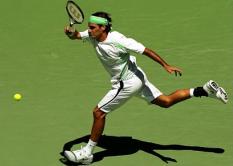 As Roger Federer sees it, there’s room for more than one Swiss star at the Australian Open. On a day when heat proved the most formidable opponent – temperatures hit 104 degrees – Federer advanced to the round of 16 with a 6-3, 6-4, 6-3 victory over 30th-seeded Max Mirnyi of Belarus. Federer, top ranked and going for his second Australian Open crown, is happy to see someone else carry the Swiss flag in the season’s first major. “Fantastic. I’m extremely happy she’s back,” he said referring to Martin Hingis’ comeback. “I really hope she can go a long way. Being a Swiss, I’m really excited.” He finished off his opponent in under two hours in the last night match at Rod Laver Arena, completing a day that started with Hingis racing through her third-round match before the scorching sun kicked in. “I’m happy. I haven’t lost a set, I’m through to the fourth round once again,” Federer said. “Everything is feeling good. I have no injuries. I’m a happy person.” 🙂 Andy Roddick had 17 aces in a 6-1, 6-2, 6-2 win over French qualifier Julien Benneteau on Friday, hustling through the third round as temperatures started rising at the Australian Open. The 23-year-old American, seeded second, won 17 of the first 18 points against Benneteau, hitting five aces in his first two service games and racing to a 5:0 lead. “I’m just trying to be aggressive,” Roddick said. He clinched the first set in 19 minutes when Benneteau’s backhand landed long. When the ball came back from Roddick, Benneteau angrily belted it into the crowd. Benneteau held serve to open the second set but Roddick went on a five-game run. He won the set on another error by the Frenchman, who wore ice packs on his neck in the breaks between games to cope with temperatures that reached 91 degrees (35 Celsius). The extreme heat policy was put in effect Friday afternoon when the temperature exceeded 96. New matches on outside courts were suspended for an hour under the so-called heat stress index guideline, which combines the ambient air temperature and court surface temperature. Roddick, who had 28 winners and only 16 unforced errors, said he didn’t mind the heat and wasn’t in any particular hurry despite finishing in 1 hour, 22 minutes. His next opponent is Marcos Baghdatis of Cyprus, who beat Denis Gremelmayr 6-2, 6-1, 6-2. No. 11 David Ferrer beat No. 18 Mario Ancic 6-3, 6-3, 6-3, and Fabrice Santoro overcame No. 8 Gaston Gaudio 6-3, 6-2, 5-7, 1-6, 6-4 in an entertaining match that lasted 3 hours, 47 minutes – Gaudio second year in a row lost a 5-set match on Rod Laver Arena. In the 3rd set, both players traded between-the-legs shots in one rally featuring all kinds of trick shots, including Santoro’s two-handed slice forehand. Baghdatis works the ball and the crowd. His rowdy fans at Melbourne Park helped him through and then circled Rod Laver Arena while chanting during Roddick’s match – giving the American a taste of what to expect in the next round. Dominik Hrbaty‘s victories have all been over five sets: Oliver Marach, big Dick Norman and improving Igor Andreev have been dispatched in similar fashion. But at one point in his latest start Hrbaty was looking set to make the long journey home. He looked in control at two sets to one up but lost the fourth and, when he went 4:1 down in the decider, things looked grim. At that stage Andreev was matched at 1.06 on Betfair. But Hrbaty’s stamina came into play once again – he has won 11 of his last 13 five-set matches and 16 of 23 in total – and he dug deep for a 1-6, 6-4, 6-3, 2-6, 6-4 win. Sixth seed Guillermo Coria was dumped from the Australian Open on Saturday in four sets by French 25th seed Sebastien Grosjean. Grosjean, a semi-finalist here in 2001 and a two-time quarter-finalist, ousted the Argentine 6-2, 6-2, 3-6, 6-4 in 2 hrs 52 min in brutal heat (Coria committed 23 double faults – record) and will play Frenchman Paul-Henri Mathieu in the round of 16 on Monday. Mathieu ousted Luis Horna 7-6(2), 7-6(7), 6-1 coming back from a 2:5 deficit in two sets. Coria sought a medical timeout at 1:1 in the fourth set and dropped serve twice on resumption as Grosjean took charge in searing
As Roger Federer sees it, there’s room for more than one Swiss star at the Australian Open. On a day when heat proved the most formidable opponent – temperatures hit 104 degrees – Federer advanced to the round of 16 with a 6-3, 6-4, 6-3 victory over 30th-seeded Max Mirnyi of Belarus. Federer, top ranked and going for his second Australian Open crown, is happy to see someone else carry the Swiss flag in the season’s first major. “Fantastic. I’m extremely happy she’s back,” he said referring to Martin Hingis’ comeback. “I really hope she can go a long way. Being a Swiss, I’m really excited.” He finished off his opponent in under two hours in the last night match at Rod Laver Arena, completing a day that started with Hingis racing through her third-round match before the scorching sun kicked in. “I’m happy. I haven’t lost a set, I’m through to the fourth round once again,” Federer said. “Everything is feeling good. I have no injuries. I’m a happy person.” 🙂 Andy Roddick had 17 aces in a 6-1, 6-2, 6-2 win over French qualifier Julien Benneteau on Friday, hustling through the third round as temperatures started rising at the Australian Open. The 23-year-old American, seeded second, won 17 of the first 18 points against Benneteau, hitting five aces in his first two service games and racing to a 5:0 lead. “I’m just trying to be aggressive,” Roddick said. He clinched the first set in 19 minutes when Benneteau’s backhand landed long. When the ball came back from Roddick, Benneteau angrily belted it into the crowd. Benneteau held serve to open the second set but Roddick went on a five-game run. He won the set on another error by the Frenchman, who wore ice packs on his neck in the breaks between games to cope with temperatures that reached 91 degrees (35 Celsius). The extreme heat policy was put in effect Friday afternoon when the temperature exceeded 96. New matches on outside courts were suspended for an hour under the so-called heat stress index guideline, which combines the ambient air temperature and court surface temperature. Roddick, who had 28 winners and only 16 unforced errors, said he didn’t mind the heat and wasn’t in any particular hurry despite finishing in 1 hour, 22 minutes. His next opponent is Marcos Baghdatis of Cyprus, who beat Denis Gremelmayr 6-2, 6-1, 6-2. No. 11 David Ferrer beat No. 18 Mario Ancic 6-3, 6-3, 6-3, and Fabrice Santoro overcame No. 8 Gaston Gaudio 6-3, 6-2, 5-7, 1-6, 6-4 in an entertaining match that lasted 3 hours, 47 minutes – Gaudio second year in a row lost a 5-set match on Rod Laver Arena. In the 3rd set, both players traded between-the-legs shots in one rally featuring all kinds of trick shots, including Santoro’s two-handed slice forehand. Baghdatis works the ball and the crowd. His rowdy fans at Melbourne Park helped him through and then circled Rod Laver Arena while chanting during Roddick’s match – giving the American a taste of what to expect in the next round. Dominik Hrbaty‘s victories have all been over five sets: Oliver Marach, big Dick Norman and improving Igor Andreev have been dispatched in similar fashion. But at one point in his latest start Hrbaty was looking set to make the long journey home. He looked in control at two sets to one up but lost the fourth and, when he went 4:1 down in the decider, things looked grim. At that stage Andreev was matched at 1.06 on Betfair. But Hrbaty’s stamina came into play once again – he has won 11 of his last 13 five-set matches and 16 of 23 in total – and he dug deep for a 1-6, 6-4, 6-3, 2-6, 6-4 win. Sixth seed Guillermo Coria was dumped from the Australian Open on Saturday in four sets by French 25th seed Sebastien Grosjean. Grosjean, a semi-finalist here in 2001 and a two-time quarter-finalist, ousted the Argentine 6-2, 6-2, 3-6, 6-4 in 2 hrs 52 min in brutal heat (Coria committed 23 double faults – record) and will play Frenchman Paul-Henri Mathieu in the round of 16 on Monday. Mathieu ousted Luis Horna 7-6(2), 7-6(7), 6-1 coming back from a 2:5 deficit in two sets. Coria sought a medical timeout at 1:1 in the fourth set and dropped serve twice on resumption as Grosjean took charge in searing  temperatures under the opened roof of Vodafone Arena. He served for the match twice after Coria broke him in the eighth game but in his next service game he won on his second match point. Spain’s Tommy Robredo [19] beat American James Blake [22] for the first time in his career on Friday evening to snatch the last available spot in the fourth round of the Australian Open. Robredo, seeded 16th, had not beaten Blake in four previous meetings, including a Davis Cup rubber that was not completed, but chose his moment perfectly on Friday, winning 6-3, 6-4, 6-4 in less than two hours. Blake had gone into the match as favorite despite being seeded four places behind Robredo, following his victory at last week’s Sydney International, but gave himself no chance by committing 46 unforced errors compared to the Spaniard’s 14.
temperatures under the opened roof of Vodafone Arena. He served for the match twice after Coria broke him in the eighth game but in his next service game he won on his second match point. Spain’s Tommy Robredo [19] beat American James Blake [22] for the first time in his career on Friday evening to snatch the last available spot in the fourth round of the Australian Open. Robredo, seeded 16th, had not beaten Blake in four previous meetings, including a Davis Cup rubber that was not completed, but chose his moment perfectly on Friday, winning 6-3, 6-4, 6-4 in less than two hours. Blake had gone into the match as favorite despite being seeded four places behind Robredo, following his victory at last week’s Sydney International, but gave himself no chance by committing 46 unforced errors compared to the Spaniard’s 14.
Fourth round: John Pye
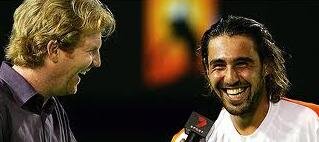 Andy Roddick thought he’d get it right at the Australian Open. Stung by a first-round exit at the U.S. Open last August, Roddick skipped the Masters Cup in November to give himself extra weeks to peak for the season’s first major. What he did not figure on, while running miles and pumping iron, was a guy like Marcos Baghdatis [54] stepping into serves and smacking returns past him with mesmerizing regularity. Baghdatis, a live-wire former junior world champion from Cyprus, hit 63 winners in a 6-4, 1-6, 6-3, 6-4 fourth-round win Sunday, advancing to a Grand Slam quarterfinal for the first time, where No. 7 Ivan Ljubicic awaits. When one return winner zipped by him in the last set, Roddick turned to the crowd and asked: “What can I do?” “It’s disappointing when you feel like you’ve put in the work and there are no unanswered questions in my eyes as far as preparation,” he said. “You’re kind of left searching a bit – that’s an uneasy feeling. I don’t know if it’s easy just to shrug off.” Roddick’s loss left fourth-seeded David Nalbandian as the highest-ranked man in the bottom half of the draw, and a likely opponent for top-seeded Roger Federer in the final. A draw that should have opened up instead slammed shut for Roddick. “Most of (the losses) are big opportunities missed – I don’t know how to grade one against another,” he said. “They’re all not fun when you’re in this situation.” Nalbandian, who upset Federer in the Masters Cup final in Shanghai, made the Australian Open quarterfinals for the fourth consecutive year with a 6-3, 6-0, 2-6, 6-2 win over No. 16 Tommy Robredo. He next faces 33-year-old Frenchman Fabrice Santoro, who reached the second week for the first time in 54 Grand Slam tournaments with a 6-4, 7-5, 7-5 win over No. 11 David Ferrer of Spain. “I am still alive, reaching the first quarterfinal of my career,” Santoro said. “I’m going to fight. I’ll be there. It’s good because I always believed in my chance to do it and I think I was proved right.” In 14 appearances at Melbourne Park, Santoro [65] has only reached the fourth round twice. “Today I knew it was my chance and maybe the last one. I always believed in my chance,” he said. “I’ve said in the past three, four years, that I keep playing tennis because I
Andy Roddick thought he’d get it right at the Australian Open. Stung by a first-round exit at the U.S. Open last August, Roddick skipped the Masters Cup in November to give himself extra weeks to peak for the season’s first major. What he did not figure on, while running miles and pumping iron, was a guy like Marcos Baghdatis [54] stepping into serves and smacking returns past him with mesmerizing regularity. Baghdatis, a live-wire former junior world champion from Cyprus, hit 63 winners in a 6-4, 1-6, 6-3, 6-4 fourth-round win Sunday, advancing to a Grand Slam quarterfinal for the first time, where No. 7 Ivan Ljubicic awaits. When one return winner zipped by him in the last set, Roddick turned to the crowd and asked: “What can I do?” “It’s disappointing when you feel like you’ve put in the work and there are no unanswered questions in my eyes as far as preparation,” he said. “You’re kind of left searching a bit – that’s an uneasy feeling. I don’t know if it’s easy just to shrug off.” Roddick’s loss left fourth-seeded David Nalbandian as the highest-ranked man in the bottom half of the draw, and a likely opponent for top-seeded Roger Federer in the final. A draw that should have opened up instead slammed shut for Roddick. “Most of (the losses) are big opportunities missed – I don’t know how to grade one against another,” he said. “They’re all not fun when you’re in this situation.” Nalbandian, who upset Federer in the Masters Cup final in Shanghai, made the Australian Open quarterfinals for the fourth consecutive year with a 6-3, 6-0, 2-6, 6-2 win over No. 16 Tommy Robredo. He next faces 33-year-old Frenchman Fabrice Santoro, who reached the second week for the first time in 54 Grand Slam tournaments with a 6-4, 7-5, 7-5 win over No. 11 David Ferrer of Spain. “I am still alive, reaching the first quarterfinal of my career,” Santoro said. “I’m going to fight. I’ll be there. It’s good because I always believed in my chance to do it and I think I was proved right.” In 14 appearances at Melbourne Park, Santoro [65] has only reached the fourth round twice. “Today I knew it was my chance and maybe the last one. I always believed in my chance,” he said. “I’ve said in the past three, four years, that I keep playing tennis because I  like the game. I’ve achieved almost everything I expected, except a quarter-final grand slam.” Nikolay Davydenko rallied from two sets and a break down Monday at the Australian Open to reach the quarterfinals and snap Dominik Hrbaty‘s run of wins in five-set matches. The fifth-seeded Davydenko also saved three break points in the last game, winning five straight points and closing the 4-6, 4-6, 6-4, 6-2, 6-3 victory with an ace. After his 3 1/2-hour win on Monday, Hrbaty had spent a total of 13 hours and 57 minutes on court at Melbourne Park. The No. 12 seed from Slovakia was only the fourth man to play four consecutive five-set matches at one Grand Slam tournament. American Robby Ginepri was the most recent, winning three times in five-setters at last year’s U.S. Open before losing the semifinal in five to Andre Agassi. While Hrbaty had five comeback wins from 0-2 in five-set matches, it was only the second time for Davydenko. After dropping serve in the seventh game of the third set, ”something happened – I tried running,” said Davydenko. ”It was difficult. I tried to fight and was winning the third, fourth and fifth – easy!” Davydenko said he hoped he didn’t face the same situation if he met Federer next round. But if so, ”I try the same. If I lose the first two sets, I try to win the third,” he said. ”If I can’t, bad luck for me.” Roger Federer overcame an uncharacteristic 58 errors in his 6-4, 6-0, 3-6, 4-6, 6-2 fourth-round win over Tommy Haas. “I was really trying to just break his momentum. Tommy was making it difficult for me to play,” Federer said. “To be honest, I like to be pushed like this.”
like the game. I’ve achieved almost everything I expected, except a quarter-final grand slam.” Nikolay Davydenko rallied from two sets and a break down Monday at the Australian Open to reach the quarterfinals and snap Dominik Hrbaty‘s run of wins in five-set matches. The fifth-seeded Davydenko also saved three break points in the last game, winning five straight points and closing the 4-6, 4-6, 6-4, 6-2, 6-3 victory with an ace. After his 3 1/2-hour win on Monday, Hrbaty had spent a total of 13 hours and 57 minutes on court at Melbourne Park. The No. 12 seed from Slovakia was only the fourth man to play four consecutive five-set matches at one Grand Slam tournament. American Robby Ginepri was the most recent, winning three times in five-setters at last year’s U.S. Open before losing the semifinal in five to Andre Agassi. While Hrbaty had five comeback wins from 0-2 in five-set matches, it was only the second time for Davydenko. After dropping serve in the seventh game of the third set, ”something happened – I tried running,” said Davydenko. ”It was difficult. I tried to fight and was winning the third, fourth and fifth – easy!” Davydenko said he hoped he didn’t face the same situation if he met Federer next round. But if so, ”I try the same. If I lose the first two sets, I try to win the third,” he said. ”If I can’t, bad luck for me.” Roger Federer overcame an uncharacteristic 58 errors in his 6-4, 6-0, 3-6, 4-6, 6-2 fourth-round win over Tommy Haas. “I was really trying to just break his momentum. Tommy was making it difficult for me to play,” Federer said. “To be honest, I like to be pushed like this.”
Quarterfinals: John Pye
Nicolas Kiefer‘s win over Sebastien Grosjean was highlighted by a bizarre point where Kiefer threw his racket into the air during a point. He advanced to the Australian Open semifinals (his only Grand Slam semifinal) with a grueling and contentious 6-3, 0-6, 6-4, 6-7(1), 8-6 win over Grosjean on Wednesday. Kiefer’s in the final four for the first time in 35 majors after playing the longest match of the tournament – 4 hours and 48 minutes. In a bizarre point at 40/30 in the 12th game, Kiefer tossed his racket over the net just 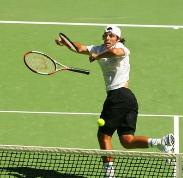 after Grosjean – serving to stay in the match – hit a forehand volley into the net. Grosjean immediately appealed for a hindrance ruling, but was denied by umpire Carlos Bernardes and then argued the point with Grand Slam supervisor Mike Morrissey – without success. Kiefer already had been warned twice for using obscene language. One more code violation would have cost him a point. He frequently questioned line calls, losing his cool as he lost the fourth-set tiebreaker and again when he was broken for a second time in the fifth set. The 28-year-old German smashed a water bottle at the changeover, but recovered to break Grosjean again and get the match back on serve. Grosjean had game points in the 14th game but Kiefer earned a match point with a pinpoint lob and clinched it when the Frenchman put a backhand volley into the net. The 14-game final set lasted 97 minutes! Grosjean was more consistent, hitting 59 winners while Kiefer hit 34 winners. Grosjean even won more points (169-160) but was hesitant in the final game. He was aiming for his fourth semifinal at a Grand Slam, and his first since 2001 at Melbourne Park. The days of unfettered progress – or is than un-Federered? – through a Grand Slam event draw seem to have come to a halt for top-seeded Roger Federer of Switzerland. He needed five sets to subdue Tommy Haas of Germany in the fourth round and required some luck and an opponent’s wavering nerve to navigate through a troubled quarterfinal. Federer saved six set points in the third set against No. 5 Nikolay Davydenko of Russia, winning 6-4, 3-6, 7-6(7), 7-6(5), in 3 hours 13 minutes on Wednesday at the Australian Open. Davydenko held leads of 4:1, 6:3, 7:6 in the third-set tiebreaker (earlier 6:5*, 40/15), and Federer called himself “a little lucky” to emerge from that deficit. “You haven’t seen me scrambling too much, especially back-to-back matches,” Federer said. “For some, it might be a surprise.” Which is why he was looking ahead, predicting a potentially difficult semifinal against Kiefer, who has defeated Federer three times in 10 meetings, but Federer has won the last six: “If you look down the results I’ve had with Davydenko, many of them have been tough. Same thing with Haas. So this for me is no surprise. Maybe it is for you. I’m not surprised. Don’t be surprised if it’s going to be tough again on Friday, because I’ve had some tough matches with Kiefer. He’s beaten me a couple of times, so I’m ready for a tough one at least.” David Nalbandian advanced to the Australian Open semifinals for the first time, overwhelming veteran Frenchman Fabrice Santoro, 7-5, 6-0, 6-0, today. The fourth-seeded Nalbandian was down a break in the first set, but reeled off 14 consecutive games to dominate the day’s first quarterfinal. Santoro, 33, and playing in the quarterfinals for the first time in 54 majors, was 13-0 when he got his first serve into play at the start. He won 34 points in the first set, but won only 16 in the next two sets. Santoro had Nalbandian sprinting from side to side, net to baseline, chasing drop shots, volleys and lobs until the 24-year-old Argentine got his ground strokes working and started passing him on both sides. “In the beginning, it was very tough, windy,” said Nalbandian, the Masters Cup champion. “Also, Fabrice has a very special game. It’s
after Grosjean – serving to stay in the match – hit a forehand volley into the net. Grosjean immediately appealed for a hindrance ruling, but was denied by umpire Carlos Bernardes and then argued the point with Grand Slam supervisor Mike Morrissey – without success. Kiefer already had been warned twice for using obscene language. One more code violation would have cost him a point. He frequently questioned line calls, losing his cool as he lost the fourth-set tiebreaker and again when he was broken for a second time in the fifth set. The 28-year-old German smashed a water bottle at the changeover, but recovered to break Grosjean again and get the match back on serve. Grosjean had game points in the 14th game but Kiefer earned a match point with a pinpoint lob and clinched it when the Frenchman put a backhand volley into the net. The 14-game final set lasted 97 minutes! Grosjean was more consistent, hitting 59 winners while Kiefer hit 34 winners. Grosjean even won more points (169-160) but was hesitant in the final game. He was aiming for his fourth semifinal at a Grand Slam, and his first since 2001 at Melbourne Park. The days of unfettered progress – or is than un-Federered? – through a Grand Slam event draw seem to have come to a halt for top-seeded Roger Federer of Switzerland. He needed five sets to subdue Tommy Haas of Germany in the fourth round and required some luck and an opponent’s wavering nerve to navigate through a troubled quarterfinal. Federer saved six set points in the third set against No. 5 Nikolay Davydenko of Russia, winning 6-4, 3-6, 7-6(7), 7-6(5), in 3 hours 13 minutes on Wednesday at the Australian Open. Davydenko held leads of 4:1, 6:3, 7:6 in the third-set tiebreaker (earlier 6:5*, 40/15), and Federer called himself “a little lucky” to emerge from that deficit. “You haven’t seen me scrambling too much, especially back-to-back matches,” Federer said. “For some, it might be a surprise.” Which is why he was looking ahead, predicting a potentially difficult semifinal against Kiefer, who has defeated Federer three times in 10 meetings, but Federer has won the last six: “If you look down the results I’ve had with Davydenko, many of them have been tough. Same thing with Haas. So this for me is no surprise. Maybe it is for you. I’m not surprised. Don’t be surprised if it’s going to be tough again on Friday, because I’ve had some tough matches with Kiefer. He’s beaten me a couple of times, so I’m ready for a tough one at least.” David Nalbandian advanced to the Australian Open semifinals for the first time, overwhelming veteran Frenchman Fabrice Santoro, 7-5, 6-0, 6-0, today. The fourth-seeded Nalbandian was down a break in the first set, but reeled off 14 consecutive games to dominate the day’s first quarterfinal. Santoro, 33, and playing in the quarterfinals for the first time in 54 majors, was 13-0 when he got his first serve into play at the start. He won 34 points in the first set, but won only 16 in the next two sets. Santoro had Nalbandian sprinting from side to side, net to baseline, chasing drop shots, volleys and lobs until the 24-year-old Argentine got his ground strokes working and started passing him on both sides. “In the beginning, it was very tough, windy,” said Nalbandian, the Masters Cup champion. “Also, Fabrice has a very special game. It’s 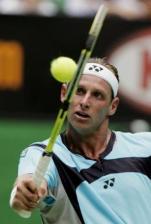 not easy to come and hit winners from the first point. In the first set I was a bit nervous – when I got a bit of confidence, I started hitting harder and better, with angles near to the line.” Santoro and Nalbandian exchanged service breaks before Santoro, serving to stay in the set at 6:5, was broken. At 0/30, the Frenchman had a rare ace but on his next point hit a backhand wide before Nalbandian blasted a forehand to the opposite corner to take the set, shouting “Si.’ Unseeded Cypriot Marcos Baghdatis extended his extraordinary run at the Australian Open on Tuesday, upsetting seventh seed Ivan Ljubicic of Croatia 6-4, 6-2, 4-6, 3-6, 6-3 to reach the semi-finals. Baghdatis, a former world junior number one currently ranked 54th, followed his shock win over second seed Andy Roddick with another gritty victory under floodlights at the Rod Laver Arena. Baghdatis played superbly in the first two sets, unleashing his full range of shots to grab a two-set lead before Ljubicic fought back to win the next two and force the match into a decider. Baghdatis, 20, fended off two break points in a tense third game then ripped a cross-court forehand past Ljubicic to gain the decisive break in the next game. Baghdatis squandered seven break points in the opening set before he finally broke 26-year-old Ljubicic in the ninth game off a forehand error. He broke twice more in the second set, the first off a backhand winner and the second off another Ljubicic mistake, before the errors started creeping into his own game. A double fault set up the break Ljubicic needed to grab the third set then another double fault cost him the fourth set as well before he regained his composure in the decider. Baghdatis’ success has sparked a surge of interest in tennis in his native Cyprus. He first picked up a racket aged four and his tennis fan father encouraged him to keep playing. Baghdatis was named “Man of the Year” in Cyprus after reaching the fourth round at Melbourne Park last year and he said he could onl”It’s disappointing when you feel like you’ve put in the work and there are no unanswered questions in my eyes as far as preparation,”y guess what the mood was like back home. “I don’t really know but I think it’s getting crazy, Roddick’s loss left fourth-seeded I think they’re all watching the match,” he said. Baghdatis left his Limassol home at 14 for the Mouratoglou Tennis Academy in Paris. His two older brothers both played Davis Cup for Cyprus. He said one is now a tennis coach while the other is a mathematics professor in the United States.
not easy to come and hit winners from the first point. In the first set I was a bit nervous – when I got a bit of confidence, I started hitting harder and better, with angles near to the line.” Santoro and Nalbandian exchanged service breaks before Santoro, serving to stay in the set at 6:5, was broken. At 0/30, the Frenchman had a rare ace but on his next point hit a backhand wide before Nalbandian blasted a forehand to the opposite corner to take the set, shouting “Si.’ Unseeded Cypriot Marcos Baghdatis extended his extraordinary run at the Australian Open on Tuesday, upsetting seventh seed Ivan Ljubicic of Croatia 6-4, 6-2, 4-6, 3-6, 6-3 to reach the semi-finals. Baghdatis, a former world junior number one currently ranked 54th, followed his shock win over second seed Andy Roddick with another gritty victory under floodlights at the Rod Laver Arena. Baghdatis played superbly in the first two sets, unleashing his full range of shots to grab a two-set lead before Ljubicic fought back to win the next two and force the match into a decider. Baghdatis, 20, fended off two break points in a tense third game then ripped a cross-court forehand past Ljubicic to gain the decisive break in the next game. Baghdatis squandered seven break points in the opening set before he finally broke 26-year-old Ljubicic in the ninth game off a forehand error. He broke twice more in the second set, the first off a backhand winner and the second off another Ljubicic mistake, before the errors started creeping into his own game. A double fault set up the break Ljubicic needed to grab the third set then another double fault cost him the fourth set as well before he regained his composure in the decider. Baghdatis’ success has sparked a surge of interest in tennis in his native Cyprus. He first picked up a racket aged four and his tennis fan father encouraged him to keep playing. Baghdatis was named “Man of the Year” in Cyprus after reaching the fourth round at Melbourne Park last year and he said he could onl”It’s disappointing when you feel like you’ve put in the work and there are no unanswered questions in my eyes as far as preparation,”y guess what the mood was like back home. “I don’t really know but I think it’s getting crazy, Roddick’s loss left fourth-seeded I think they’re all watching the match,” he said. Baghdatis left his Limassol home at 14 for the Mouratoglou Tennis Academy in Paris. His two older brothers both played Davis Cup for Cyprus. He said one is now a tennis coach while the other is a mathematics professor in the United States.
Semifinals: AP
Roger Federer advanced to the Australian Open final Friday by beating German Nicolas Kiefer 6-3, 5-7, 6-0, 6-2. Federer was sharp – and occasionally brilliant – in beating the German for the seventh consecutive time (third major in a row – every time in a 4-setter). “I really turned it up when I had to,” said Federer, who won the Australian Open in 2004. The Swiss star broke Kiefer early in the first set to go up 3:1, at one point sprinting from the baseline for a drop shot and flicking a  backhand around the post and down the line for a clean winner. In the same game, Federer reached another drop shot and sent a lob over Kiefer’s head that the German hit long. Kiefer won the second set after breaking Federer at 5:6. The German wasted his first opportunity with a weak forehand into the net, but Federer sliced a backhand wide on the next. Federer committed only two unforced errors in the third set – after 26 in the first two sets – to retake control. With Federer serving at 5:0, Kiefer saw his only break point vanish on a shot that was called long but that TV replays showed was on the line (the hawk-eye system kicked off two months later). Kiefer held serve to start the final set, but Federer then won five straight games. Kiefer saved two match points while serving at 1:5, then a third as Federer served in the next game. Federer finished it off with a serve that Kiefer whacked into the net. Swiss flag T-shirts were scattered around Rod Laver Arena, and the crowd was clearly behind Federer against the testy Kiefer, who repeatedly questioned calls. Kiefer was fined earlier in the tournament for swearing and was warned twice about obscenities in the quarterfinals. The top-ranked Swiss went from Australian Open front-runner to overwhelming favorite when his closest contender, fourth-seeded David Nalbandian, lost Thursday to Marcos Baghdatis, the exciteable 20-year-old from Cyprus. As if Federer’s road weren’t already easy enough: Andre Agassi, Rafael Nadal and Marat Safin didn’t show up because of injuries, and Andy Roddick and Lleyton Hewitt lost in the early rounds. Baghdatis rallied to oust Nalbandian, 3-6, 5-7, 6-3, 6-4, 6-4, winning 17 of the last 21 points and enduring a break for a late storm when he was three points from winning. In the 2nd set Baghdatis rallied from a *1:5 (0/30) only to lose two games in a row; in the deciding set he leveled at 2 games apiece after an initial 0:2* (0/30) disadvantage, afterwards came back miraculously from a 2:4 deficit. “Everything is first time here: getting to the quarters was the first time, getting
backhand around the post and down the line for a clean winner. In the same game, Federer reached another drop shot and sent a lob over Kiefer’s head that the German hit long. Kiefer won the second set after breaking Federer at 5:6. The German wasted his first opportunity with a weak forehand into the net, but Federer sliced a backhand wide on the next. Federer committed only two unforced errors in the third set – after 26 in the first two sets – to retake control. With Federer serving at 5:0, Kiefer saw his only break point vanish on a shot that was called long but that TV replays showed was on the line (the hawk-eye system kicked off two months later). Kiefer held serve to start the final set, but Federer then won five straight games. Kiefer saved two match points while serving at 1:5, then a third as Federer served in the next game. Federer finished it off with a serve that Kiefer whacked into the net. Swiss flag T-shirts were scattered around Rod Laver Arena, and the crowd was clearly behind Federer against the testy Kiefer, who repeatedly questioned calls. Kiefer was fined earlier in the tournament for swearing and was warned twice about obscenities in the quarterfinals. The top-ranked Swiss went from Australian Open front-runner to overwhelming favorite when his closest contender, fourth-seeded David Nalbandian, lost Thursday to Marcos Baghdatis, the exciteable 20-year-old from Cyprus. As if Federer’s road weren’t already easy enough: Andre Agassi, Rafael Nadal and Marat Safin didn’t show up because of injuries, and Andy Roddick and Lleyton Hewitt lost in the early rounds. Baghdatis rallied to oust Nalbandian, 3-6, 5-7, 6-3, 6-4, 6-4, winning 17 of the last 21 points and enduring a break for a late storm when he was three points from winning. In the 2nd set Baghdatis rallied from a *1:5 (0/30) only to lose two games in a row; in the deciding set he leveled at 2 games apiece after an initial 0:2* (0/30) disadvantage, afterwards came back miraculously from a 2:4 deficit. “Everything is first time here: getting to the quarters was the first time, getting  to the semis was the first time, getting to the final – I hope it continues,’’ said Baghdatis, who had many Australians of Greek heritage, all dressed in blue, chanting for him inside Rod Laver Arena. Nalbandian, the Masters Cup champion and 2002 Wimbledon finalist from Argentina, is the last man – and one of only four in 2005 – to beat Federer.
to the semis was the first time, getting to the final – I hope it continues,’’ said Baghdatis, who had many Australians of Greek heritage, all dressed in blue, chanting for him inside Rod Laver Arena. Nalbandian, the Masters Cup champion and 2002 Wimbledon finalist from Argentina, is the last man – and one of only four in 2005 – to beat Federer. 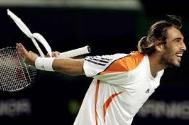 Baghdatis aims to be the next. “I believe it, my coach believe it, the guys I work with believe, my parents believe it,’’ said Baghdatis, ranked 54th. “I have worked for that… I’m very proud of myself… it’s been amazing.’’ Baghdatis produced some stunning shots – chasing into the corners, stepping into serves and racing to the net to hit 52 winners and only 41 errors. Nalbandian had four fewer winners and 15 more unforced errors. Baghdatis’ winning streak includes victories here over No. 2 Roddick and No. 7 Ivan Ljubicic. Against Nalbandian, he rallied from two sets down and then twice from service breaks in the fifth set. “I just didn’t think – I was in my own world,’’ said Baghdatis, who lost to Federer in the fourth round last year at the Australian Open. Nalbandian, who said he had abdominal muscle pain that affected his serve, was left almost speechless by the loss. “I got a lot of chances to win the match,’’ he said. “I can’t understand how I missed that opportunity.’’ Baghdatis snapped his 9-match winning streak.
Baghdatis aims to be the next. “I believe it, my coach believe it, the guys I work with believe, my parents believe it,’’ said Baghdatis, ranked 54th. “I have worked for that… I’m very proud of myself… it’s been amazing.’’ Baghdatis produced some stunning shots – chasing into the corners, stepping into serves and racing to the net to hit 52 winners and only 41 errors. Nalbandian had four fewer winners and 15 more unforced errors. Baghdatis’ winning streak includes victories here over No. 2 Roddick and No. 7 Ivan Ljubicic. Against Nalbandian, he rallied from two sets down and then twice from service breaks in the fifth set. “I just didn’t think – I was in my own world,’’ said Baghdatis, who lost to Federer in the fourth round last year at the Australian Open. Nalbandian, who said he had abdominal muscle pain that affected his serve, was left almost speechless by the loss. “I got a lot of chances to win the match,’’ he said. “I can’t understand how I missed that opportunity.’’ Baghdatis snapped his 9-match winning streak.
Final: John Pye
Always in control on the court, Roger Federer was overcome with emotion while accepting his Australian Open trophy from one of the few people he’s still trying to match. The top-ranked Federer fulfilled overwhelming expectations by beating unlikely finalist Marcos Baghdatis 5-7, 7-5, 6-0, 6-2 in Sunday’s final to claim his seventh Grand Slam title and third in succession. He tearfully embraced tennis great Rod Laver while receiving his trophy. Laver twice swept the Grand Slams, a feat Federer will try to emulate this season – if he finally can win a French Open. Federer wept and was stuck for words at the award presentation. “I was so happy,” he said. “Then I had to go up on stage and speak. This is really too much for me sometimes. It’s just a dream come true every time I 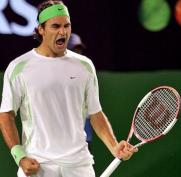 win a Grand Slam. I can’t block it out – I’m also just human.””I saw him cry, and I start crying,” Baghdatis said. “He is a great person. He shows a lot. He gives a lot to the people, I think. It’s just so emotional up there. You cannot control yourself.” Federer maintained his perfect record in seven major finals. And, at 24, he’s halfway toward Pete Sampras‘ all-time record of 14 Grand Slam titles. Sampras also was 24 when he won his seventh. Federer, who is the first since Sampras to win three consecutive majors, said he was unusually nervous as an overwhelming favorite against the 54th-ranked Cypriot, a former junior world champion. “The whole fact of being such a huge favorite. And if I lose, a huge upset since I don’t know when,” Federer said. “The whole thing was building up and waiting all day for the night session – that is nerve-racking on top of it. It was really tough for me mentally.” An 11-game winning streak from *5:5 (0/30) in the second set eased Federer’s nerves and took the match away from Baghdatis, who said his problems started when he began to think a huge upset was within reach. Baghdatis’ raucous fans, who grew in number as he ousted second-seeded Andy Roddick, No. 4 David Nalbandian and two other seeded players in the tournament, chanted between points. Dressed as if for a soccer match, they waved flags, cheered and whistled to the end. “I wanted to continue being aggressive… not to give Federer time to play his game,” Baghdatis said. “Maybe I was a bit scared of him. Maybe I didn’t really believe it. Things were happening so fast.” Federer acknowledged being concerned about a massive upset after falling a set and a break behind (0:2 in the 2nd). “I was struggling so much to hold my serve… I was sweating like crazy,” he said. “I thought, ‘Well, if this is going to continue, I’ll probably lose and (only) a miracle is going to save me.” Baghdatis had three game points at 5:6 to force a tiebreaker in the second, but Federer rallied to break on a Baghdatis forehand that was ruled just long. Federer then lifted his level of play, winning 27 of the 37 points in the third set to take control. Baghdatis had cramps in his left calf in the fourth set, and treatment didn’t help. He later said they probably were due to nerves. Federer set up match point with a forehand crosscourt, his 50th winner, and sealed the
win a Grand Slam. I can’t block it out – I’m also just human.””I saw him cry, and I start crying,” Baghdatis said. “He is a great person. He shows a lot. He gives a lot to the people, I think. It’s just so emotional up there. You cannot control yourself.” Federer maintained his perfect record in seven major finals. And, at 24, he’s halfway toward Pete Sampras‘ all-time record of 14 Grand Slam titles. Sampras also was 24 when he won his seventh. Federer, who is the first since Sampras to win three consecutive majors, said he was unusually nervous as an overwhelming favorite against the 54th-ranked Cypriot, a former junior world champion. “The whole fact of being such a huge favorite. And if I lose, a huge upset since I don’t know when,” Federer said. “The whole thing was building up and waiting all day for the night session – that is nerve-racking on top of it. It was really tough for me mentally.” An 11-game winning streak from *5:5 (0/30) in the second set eased Federer’s nerves and took the match away from Baghdatis, who said his problems started when he began to think a huge upset was within reach. Baghdatis’ raucous fans, who grew in number as he ousted second-seeded Andy Roddick, No. 4 David Nalbandian and two other seeded players in the tournament, chanted between points. Dressed as if for a soccer match, they waved flags, cheered and whistled to the end. “I wanted to continue being aggressive… not to give Federer time to play his game,” Baghdatis said. “Maybe I was a bit scared of him. Maybe I didn’t really believe it. Things were happening so fast.” Federer acknowledged being concerned about a massive upset after falling a set and a break behind (0:2 in the 2nd). “I was struggling so much to hold my serve… I was sweating like crazy,” he said. “I thought, ‘Well, if this is going to continue, I’ll probably lose and (only) a miracle is going to save me.” Baghdatis had three game points at 5:6 to force a tiebreaker in the second, but Federer rallied to break on a Baghdatis forehand that was ruled just long. Federer then lifted his level of play, winning 27 of the 37 points in the third set to take control. Baghdatis had cramps in his left calf in the fourth set, and treatment didn’t help. He later said they probably were due to nerves. Federer set up match point with a forehand crosscourt, his 50th winner, and sealed the 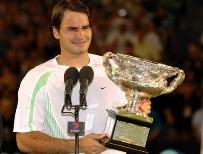 2-3/4-hour victory when Baghdatis netted a backhand. Federer’s next career goal is a French Open title. A win at Roland Garros would give him four consecutive majors across two seasons, and he’d be halfway to a proper Grand Slam – last accomplished by Laver in 1969. “Absolutely, there’s some pressure there. I feel it already,” Federer said. Laver twice won all four majors in one season – the first time before turning pro in 1962. Federer’s seven major titles (35 overall at the time) tie him with eight other players – including John McEnroe, John Newcombe and Mats Wilander – and leave him one behind Andre Agassi, Jimmy Connors, Ivan Lendl, Fred Perry and Ken Rosewall. Perry won them all in the pre-Open era (1933-36), Newcombe (1967-75) and Rosewall across two eras (1953-72). He passed childhood heroes Boris Becker and Stefan Edberg, who had six apiece. “I left my idols behind me now. That means something, I’m very pleased,” he said. “But they’re still my heroes from back in the day, Becker and Edberg.” Sampras won his seventh major in his 22nd try. Federer was playing in his 27th. Their birthdays are four days apart, and they won their seventh Grand Slam titles at the same age. “It’s quite scary if I compare it,” Federer said. “I’m on the same road, but I’ve got to maintain it.” Stats of the final.
2-3/4-hour victory when Baghdatis netted a backhand. Federer’s next career goal is a French Open title. A win at Roland Garros would give him four consecutive majors across two seasons, and he’d be halfway to a proper Grand Slam – last accomplished by Laver in 1969. “Absolutely, there’s some pressure there. I feel it already,” Federer said. Laver twice won all four majors in one season – the first time before turning pro in 1962. Federer’s seven major titles (35 overall at the time) tie him with eight other players – including John McEnroe, John Newcombe and Mats Wilander – and leave him one behind Andre Agassi, Jimmy Connors, Ivan Lendl, Fred Perry and Ken Rosewall. Perry won them all in the pre-Open era (1933-36), Newcombe (1967-75) and Rosewall across two eras (1953-72). He passed childhood heroes Boris Becker and Stefan Edberg, who had six apiece. “I left my idols behind me now. That means something, I’m very pleased,” he said. “But they’re still my heroes from back in the day, Becker and Edberg.” Sampras won his seventh major in his 22nd try. Federer was playing in his 27th. Their birthdays are four days apart, and they won their seventh Grand Slam titles at the same age. “It’s quite scary if I compare it,” Federer said. “I’m on the same road, but I’ve got to maintain it.” Stats of the final.
***********************************

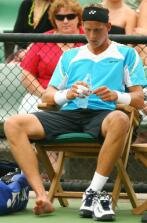

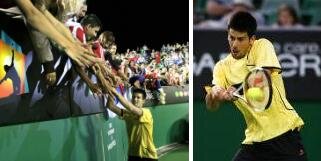
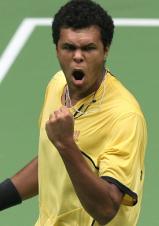

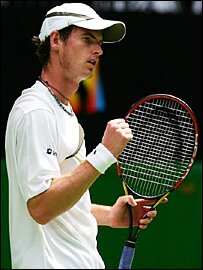
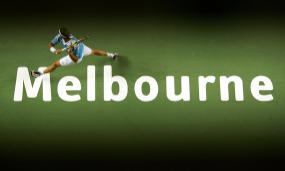
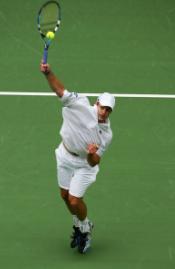
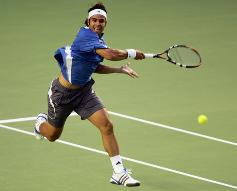
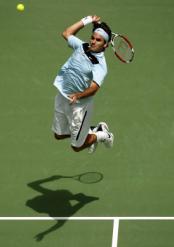
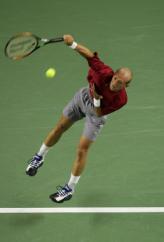
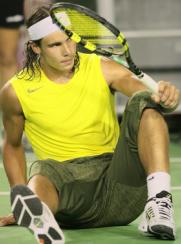
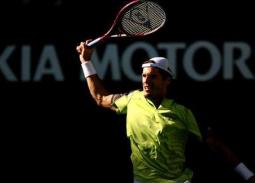

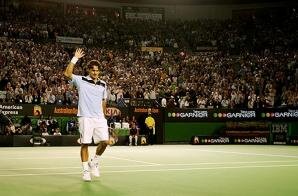
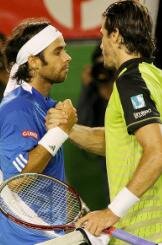


2006
Coria vs. Luzzi – http://www.youtube.com/watch?v=nO_Wq_01auw
Federer vs. Haas – http://www.youtube.com/watch?v=_k_Z6Ijd2DY
Federer vs. Davydenko – http://www.youtube.com/watch?v=16MvPQ-YWk8
Federer vs. Kiefer – http://www.youtube.com/watch?v=BdjOX1H6kLk
Baghdatis vs. Nalbandian – http://www.youtube.com/watch?v=nO_Wq_01auw
Federer vs. Baghdatis – http://www.youtube.com/watch?v=YvGEnN1c0XU (entire match)
Federer’s emotional speech – http://www.youtube.com/watch?v=EQM9RMRN8pI
2007
Blake vs. Moya – http://www.youtube.com/watch?v=2lgPxZMI0Qc
Roddick vs. Tsonga – http://www.youtube.com/watch?v=s6CmBiyfpSg
Federer vs. Bjorkman – http://www.youtube.com/watch?v=BDpYo3LiwZw
Djokovic vs. F.Lopez – http://www.youtube.com/watch?v=Pdr-Vh333rs
Nadal vs. Kohlschreiber – http://www.youtube.com/watch?v=r_1-CKzlU6k
Murray vs. Verdasco – http://www.youtube.com/watch?v=KoXoefZoVIg
Monfils vs. Baghdatis – http://www.youtube.com/watch?v=XCRw86lU-tk
Federer vs. Youzhny – http://www.youtube.com/watch?v=q_m6rjYt_X0
Gasquet vs. Monfils – http://www.youtube.com/watch?v=LyAuU9EyDqU
Roddick vs. Safin – http://www.youtube.com/watch?v=b0wgM9yjfOM
Nalbandian vs. Grosjean – http://www.youtube.com/watch?v=Qejr9i0oKd8
Federer vs. Djokovic – http://www.youtube.com/watch?v=aaawe4NbQHs
Nadal vs. Murray – http://www.youtube.com/watch?v=zTnjCZr35NI
Roddick vs. Ancic – http://www.youtube.com/watch?v=FGbjVb4sLik
Federer vs. Robredo – http://www.youtube.com/watch?v=rbBo3a5euMI
Haas vs. Davydenko – http://www.youtube.com/watch?v=Vfm1hXzxYpY
Gonzalez vs. Nadal – http://www.youtube.com/watch?v=jBOeQayp26A
Federer vs. Roddick – http://www.youtube.com/watch?v=7ikx0Du735Y
Gonzalez vs. Haas – http://www.youtube.com/watch?v=5lR92UVCZV0
Federer vs. Gonzalez – http://www.youtube.com/watch?v=EcyZIVyvfBY (full match)
Federer’s 36 winners – http://www.youtube.com/watch?v=6fy5dNLP0go